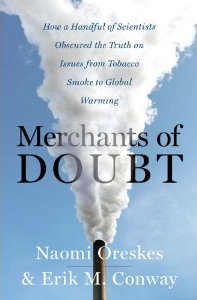I have to preface this review by saying that when it comes to American politics, I am non-partisan - Ed.
Written by two science historians, Merchants of Doubt is a deeply unsettling account of the organized campaign against science in order to achieve political or financial gain that has been going on in the United States since the 1960s. It begins with the cigarette industry hiring former Manhattan Project physicists to cast doubt on the then-emerging scientific consensus that smoking causes cancer and other diseases, and the book continues through organized misinformation campaigns waged in favor of the Strategic Defense Initiative (a space-based anti-missile defense system dubbed "Star Wars" in the 1980s), against nuclear winter, acid rain, the hole in the ozone layer, the ban on DDT, and climate change. What all of these campaigns have in common are, a) the same cast of characters, chiefly retired government physicists, b) the same playbook, and c) their stunning effectiveness.
This is, flat-out, the most Orwellian true story I've ever read.
Through extensive (and boy do I mean extensive) research and citations, authors Naomi Oreskes and Erik M. Conway assembled essentially a timeline of scientific knowledge on each of these topics, and then chronicled the well-funded and strategically-orchestrated attempts to cast doubt on that knowledge by using an arsenal that included:
- a pattern of bypassing the scientific peer-review process by taking spurious (or completely unfounded) scientific claims directly to the mass media
- exploiting a residual media bias left over from the "Fairness Doctrine" to ensure coverage
- accusing scientists of "politicizing" their findings (which is what the accusers were, in fact, doing themselves)
- publicly asking incriminating questions whose answers were known in the scientific community but not by the lay public
- accusing dissenting voices of being enemies of freedom
- mounting ad hominem attacks on scientists whose work they could not discredit
I realize that this sounds like anti-GOP propaganda or a liberal agenda masquerading as science reporting. But that's kind of the point. That reaction is how we've been, for lack of a better word, programmed. Despite the extensive citations and references, I didn't want to believe that this book's argument was legit, so I did my own brief research before writing this review just to confirm that the reporting behind the book was sound, and it sure seems to be. I even wrote to the authors, and they wrote back. If there is a problem with this book, it is that some of the chapters are so dense with blow-by-blow chronologies of events, reports, review comments, internal memos, meeting minutes and the like that the read does get a little bogged down. But I think that level of minutiae was necessary to protect the book's contents from partisan attacks, as well as simply casual denials. "That can't be true. That strains credulity. No way that happened." But it did. And it's all proven.
Ok, so terrifying-dystopian-nightmare-is-actually-terrifying-reality. That's bad. But that's only one aspect of the book. If you think a little outside the lines — pull the thread a little bit, like I said before — and think about the guys behind these long cons, the story takes on epic, Shakespearean proportions on a human level. What would prompt decorated scientists who spent their entire careers working for the U.S. government to spend their retirement as consultants who actively undermined the very field that they had given their entire professional lives to? Well, money, sure. But I think it goes beyond that, and the authors do, too.
Some of these guys feel like classic villains in that they didn't receive the accolades they felt they deserved from the larger scientific community, so they took their revenge later by discrediting that community. Ok. But for the rest of them, they feel more like tragic heroes. These guys won the Cold War, and they did it with science. More than giving their lives to science, they gave it to Freedom. And once the Cold War was won by these men who were assuredly warriors, what was left to fight? I was reminded of Richard III, who opens his eponymous play saying that while others may enjoy the fruits of a hard-earned peace, he is not shaped for such pleasures, and "since I cannot prove a lover...I am determined to prove a villain." Late in Merchants of Doubt, we see specific examples of how, starting in the 1980s as actual communism loosened its grip on Europe, people began claiming that environmentalists were actually communists in disguise. They brought out the old saw of the "slippery slope," saying that anyone who wanted to regulate anything only did so out of a hidden, communist agenda. So the Cold Warriors went back to work. The sad irony is that their lasting legacy was one of undermining their own life's work.
But in Richard III, we see the comeuppance, the realization by the tragic figure of his own failure, and what it has cost. "My kingdom for a horse" has lived for four hundred years because audiences relish watching a man who has caused so much misery and bloodshed to possess power offer it all away for a horse. In reality, though, there was no comeuppance. These men (those who have now died) went to their graves wealthy, thinking they had fought the good fight. The ones left bleeding, shot full of arrows, were us.
The Math
Objective Quality: 7/10
Bonuses: +1 for the extensive research; +1 for the conclusion, which really puts a human face on what has come before; +2 for being a Really Important Book
Penalties: -1 for being quite tedious in parts; -1 for depressing the shit out of me
Nerd Coefficient: 9/10. This is essential reading.
Published by Vance K — cult film reviewer, occasional book reviewer, and co-editor of nerds of a feather, flock together since 2012.
